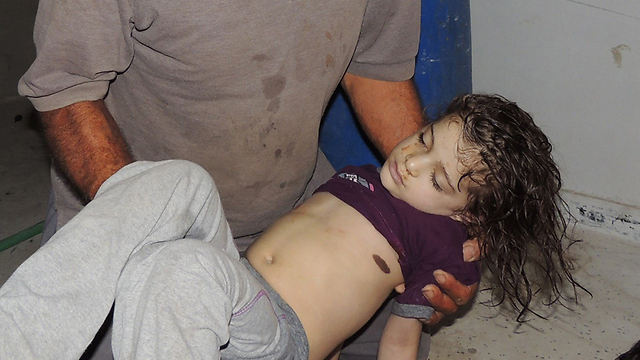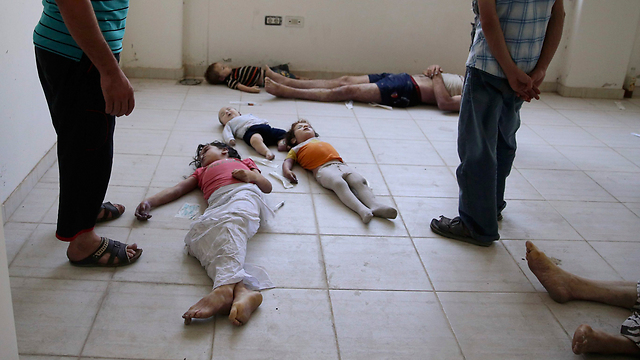
Initial Western intelligence finds Assad used chemical weapons
First assessments reveal Syrian forces behind massacre which killed dozens if not hundreds of civilians in Damascus. 'Still seeking conclusive proof,' source says
US and allied intelligence agencies' have made a preliminary assessment that chemical weapons were used by Syrian forces in an attack near Damascus this week, likely with high-level approval from the government of President Bashar Assad, according to American and European security sources.
The early intelligence finding could increase pressure for action by President Barack Obama, who has made clear that he plans to tread cautiously even as his aides air their differences in a debate over possible military responses to the Syrian government.
Related stories:
- Opposition says as many as 1,300 killed in gas attack
- Obama says concerned about Syria
- US weighing response to Syria chemical assault
The sources, speaking on condition of anonymity, cautioned that the assessment was preliminary and, at this stage, they were still seeking conclusive proof, which could take days, weeks or even longer to gather.
Photos from the massacre (Photo: Reuters)
(Photo: Reuters)
(Photo: Reuters)
(Photo: Reuters)
In his first public comments since Wednesday's attack in the Damascus suburbs, Obama called the
incident "very troublesome" and a "big event of grave concern" but made clear he was in no rush to get war-weary Americans entangled in another Middle East conflict.
Obama's wary response, which underscored a deep reluctance by Washington to intervene in Syria's 2-1/2-year-old civil war, came as senior US officials weighed choices ranging from increased international sanctions to the use of force, including possible air strikes on Assad's forces, administration sources
said.
A high-level meeting of members of Obama's National Security Council, the Pentagon, State Department and intelligence agencies was held at the White House late on Thursday but made no decisions on what to recommend, officials said, and further discussions were planned.
One US official acknowledged that the participants aired "differing viewpoints" but pushed back against the notion that the administration - whose Syria policymaking has been marked by internal dissent in the past - was deeply sharply divided on a possible US response.
"It's not like people were screaming at each other," the official said.
(Photo: Reuters)
(Photo: Reuters)
International powers, including Russia, have urged Assad to cooperate with a UN inspection team that arrived on Sunday to pursue earlier allegations of chemical weapons attacks.
However, there was no public response from the Syrian government, whose forces have been pounding the Damascus region for days, making any mission by the international experts perilous - as well as possibly destroying evidence. Syria denies being responsible and has in the past accused rebels of using chemical weapons.
While the preliminary US assessment was that Assad loyalists carried out Wednesday's chemical attack with high level authorization, one US source closely monitoring events in the region said it was also possible that a local commander decided on his own to use gas in advance of a ground assault.
The commander may have been under pressure from top echelons to clear rebels from the area and protect his own troops against rebel counter-attacks, the source said.
"What we've seen indicates that this is clearly a big event, of grave concern," Obama said in an interview on CNN's "New Day" program that aired on Friday, as anti-Assad rebels braved the front lines around Damascus to smuggle tissue samples to UN inspectors from victims of Wednesday's apparent mass
poisoning.
But when pressed about his comment a year ago that chemical weapons use in Syria would cross a "red line," Obama - who was on a two-day bus tour of the Northeast - expressed caution.
At Thursday's White House meeting, which lasted more than three hours, Obama's aides had a "robust discussion" of the diplomatic and military options available to the president, US officials said.
Among the military options are targeted cruise missile strikes on Syrian military units believed
responsible for chemical attacks or on Assad's air force and ballistic missile sites. Seen as more risky would be a sustained air campaign against Assad's forces, such as the one used in Libya in 2011.
A White House spokesman reiterated Obama's position that he did not intend to put "boots on the ground," and an administration official said Thursday's White House meeting also steered clear of the idea of enforcing a "no-fly" zone there, the official said.
- Receive Ynetnews updates directly to your desktop












